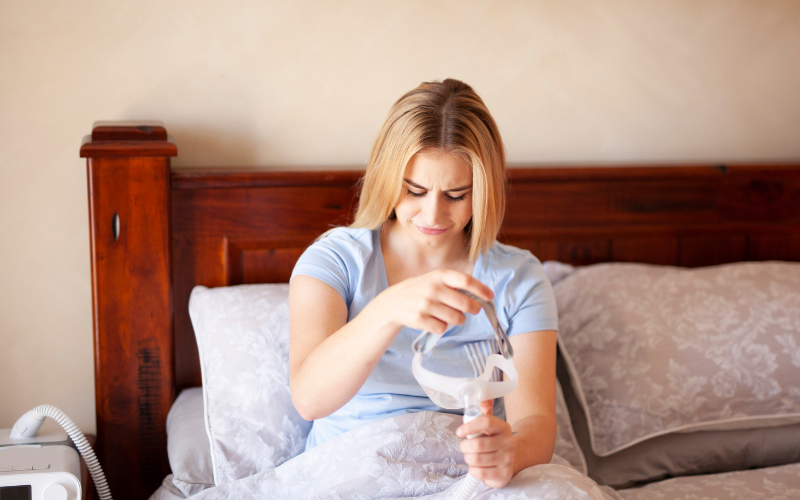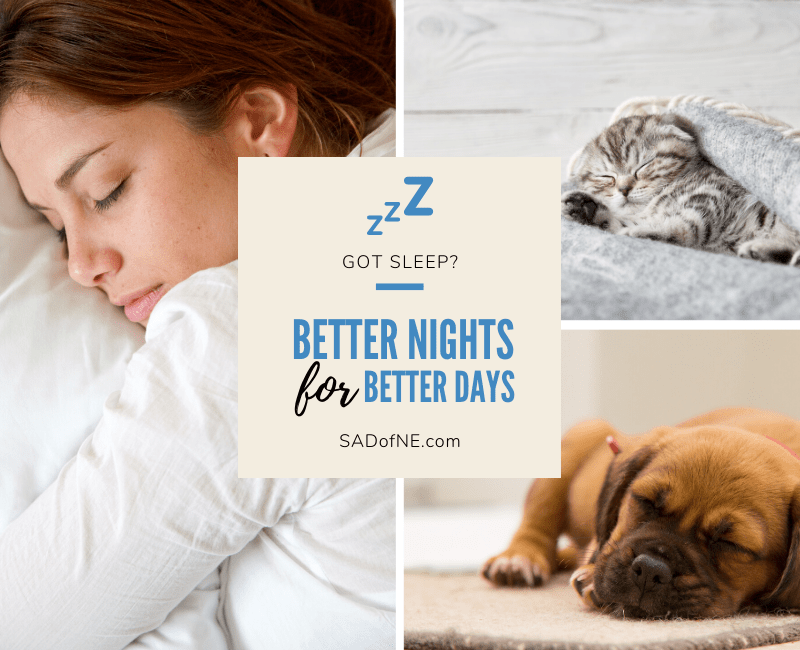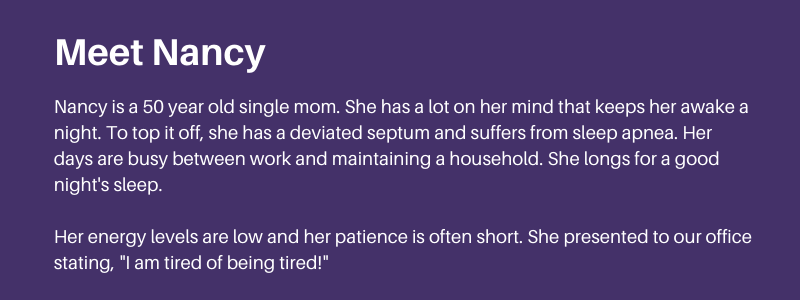CPAP Crisis Creates Chaos for Apnea Victims and Snorers!
Original Article | The People’s Pharmacy
Do you know someone who snores and/or stops breathing temporarily? They could have sleep apnea. Why is there a CPAP crisis? Who is at fault?

According to the AMA, “About 30 million people in the United States have sleep apnea, but only 6 million are diagnosed with the condition.” People with sleep apnea may stop breathing many times during the night. These episodes can last a few seconds or as long as a minute or two. They can occur dozens of times an hour. There is a CPAP crisis going on because many patients are having a hard time getting safe CPAP devices. Disclaimer: we do not know who made the CPAP device in the photo. The illustration is not intended as criticism.
What’s It Like To Suffer Sleep Apnea?
I have tried holding my breath while timing it with my smart phone stopwatch. It starts to get uncomfortable around 25 seconds and I have to take a breath around 30 seconds. I have a hard time imagining what it would be like to go longer than that.
Obstructive sleep apnea (OSA) is caused by the collapse of muscles in the throat. This can block the airway. The result is reduced oxygenation of the circulating blood.
Patients with OSA often suffer from daytime sleepiness and brain fog. That makes them more prone to accidents. They are also more likely to develop hypertension, strokes, irregular heart rhythms or heart attacks.
Symptoms can include noisy snoring interrupted by gasping or gagging sounds. For a bed partner, this can be scary and/or annoying. It’s hard to sleep when the person nearby is “sawing wood” and intermittently gasping for air. People with OSA may also complain about frequent nighttime trips to the bathroom to pee, morning headaches, daytime irritability and “cotton mouth” upon awakening.
Treating OSA and the CPAP Crisis:
To treat sleep apnea, doctors prescribe machines that pump air in a continuous stream that can help keep the airways open. They are called CPAP devices, for continuous positive airway pressure. Some people find the devices noisy and uncomfortable. You have to wear a kind of face mask that pushes air into the throat and lungs.
Others find the devices improve the quality of their lives. Here is just one of the hundreds of messages we have received on our website:
Jerry reports that CPAP made a difference:
“Sleep apnea is a medical condition that can cause frequent nighttime urination. After being diagnosed with severe obstructive sleep apnea, I was treated using CPAP therapy.
“The very first night after getting my CPAP machine I slept for a full 7 hours. Before treatment, I was waking and passing large amounts of urine every 1-2 hours. My blood pressure went from high to normal, and my heart rate during exercise dropped by 20 heartbeats.”
The CPAP Crisis Is Creating Chaos:
Needless to say, people with serious sleep apnea rely on these machines and are well aware that their lives depend on them. Just imagine the panic they might feel if their machines were no longer available.
That has happened to far too many patients over the last year, as the company that dominates the industry, Philips Respironics, fumbled a recall of faulty CPAP devices.
Here is what one reader wrote us about the CPAP crisis:
“My husband has sleep apnea, so he has used a CPAP for over 12 years. Recently his machine stopped working. When he contacted his supplier, he was told his machine had been recalled and he would have to wait for a replacement. They advised him to contact the manufacturer, Philips.
“He called Philips, and after following the instructions to restart the machine, was told it was not working. That was July 11. We had just gotten home from the ER where we both tested positive for COVID and received infusions. So he has been without his CPAP since then.
Anxiety interferes with sleep:
“He is very aware of the dangers of not using the CPAP machine and has been sleeping very uncomfortably since then. I have been anxious as well, just listening to his snoring. Here’s hoping he does not stop breathing, as he used to do before getting the CPAP.
“I have heard that it can take up to a year to get a replacement. Surely, he is not alone in this situation. What is a person with sleep apnea supposed to do? A person at his pulmonologist’s office said they are currently diagnosing new patients with severe sleep apnea. These patients are being placed on waiting lists.
“To my mind, this situation is similar to not having baby formula available. Apparently, there are currently just two companies in the USA who manufacture CPAP devices. What can patients do without this important appliance? Doctors warn that using the machine every night is of critical importance. What can be done to help so many people in need?
“I am hoping that sleep apnea patients can soon get the machines they desperately need for a good safe night’s sleep.”
How Has the FDA Fumbled the CPAP Crisis?
Our reader is right to compare the situation with CPAP machines to the baby formula shortage. Both result from the FDA’s inadequate oversight. In our opinion, the FDA has fumbled a few too many oversight responsibilities.
That’s not just our opinion. An article in JAMA Internal Medicine, July 26, 2021 reviewed the FDA’s oversight of MAUDE (Manufacturer and User Facility Device Experience). The agency relies on device manufacturers, distributors, physicians, patients, hospitals and other health care facilities to submit reports of problems. Unfortunately, the FDA only pays attention to deaths, rather than all serious complaints.
The analysis in JAMA Internal Medicine points out that:
“For the overall sample, the percentage of reports with deaths that were not classified as deaths was 23%, suggesting that approximately 31,552 reports in our sample had deaths that were classified in other categories.”
If the FDA ignores serious complaints and overlooks deaths with misleading codes, it risks leaving flawed medical devices on the market long past their “use by” date. You can read more about the agency’s fumbling and bumbling at this link.
What Went Wrong With CPAP Machines”
On July 29, 2021, the FDA issued an announcement about problems with Philips Respironics BiPap and CPAP machines.
On May 19, 2022 the agency updated its warning:
“Philips Respironics (Philips) voluntarily recalled certain ventilators, bi-level positive airway pressure (also known as Bilevel PAP, BiPAP, or BPAP) machines, and continuous positive airway pressure (CPAP) machines in June 2021 due to potential health risks. The polyester-based polyurethane (PE-PUR) foam used in these medical devices to lessen sound and vibration can break down. If the foam breaks down, black pieces of foam, or certain chemicals that are not visible, could be breathed in or swallowed by the person using the device.”
The Washington Post reported on July 29, 2022 that:
“Today, those machines are at the heart of one of the biggest medical device debacles in decades.”
“If inhaled or swallowed, the emissions could cause headaches, asthma, lung problems and even cancer, the company warned in launching a massive recall. The Food and Drug Administration classified the recall as the most serious type, saying “use of these devices may cause serious injuries or deaths.”
According to the Washington Post, millions of patients have been left in limbo while they wait for their devices to be repaired or replaced.
“In May, the FDA announced it had received 21,000 reports, including 124 deaths, concerning the breakdown of the polyester-based polyurethane foam in sleep apnea machines and ventilators during the past year — a sharp increase from 30 the previous decade.”
How long has the maker of CPAP machines known there was a problem? Why didn’t the FDA discover this problem on its own? What should it do about the CPAP crisis?
Some Recommendations from The People’s Pharmacy:
Here are some of our suggestions:
- 1) The president should invoke the Defense Production Act to increase the manufacture of chips specifically for these medical devices.
- 2) Philips Respironics should prioritize delivering CPAP machines to people who are most vulnerable. The company should also communicate directly to every patient.
- 3) The FDA should be more proactive regarding critical medical devices so that a life-threatening shortage of this sort never happens again.
What Do You Think?
We would love to read your thoughts about the CPAP crisis in the comment section below. Do you know someone who snores and has obstructive sleep apnea? Have they ever used a CPAP machine? Has their device been recalled? What are they doing now?
If you think this article has merit, please send it to friends and family. We suspect that someone you know snores, has a sleep apnea and/or has a CPAP-type machine. They (and their health care providers) may not know about the problems with these devices. It’s super easy to share. Just scroll to the top of the page and click on the icons for email, Twitter and Facebook.
While you are at it, please encourage your contacts to sign up for our free online newsletter. You may have noticed that Google accepts a lot of drug and device ads. Is it any wonder that articles like this disappear almost without a trace? The only way your acquaintances can read our independent voice is to subscribe to our newsletter at this link. Thank you for supporting our work!
Contact us TODAY! Our oral devices can help.



